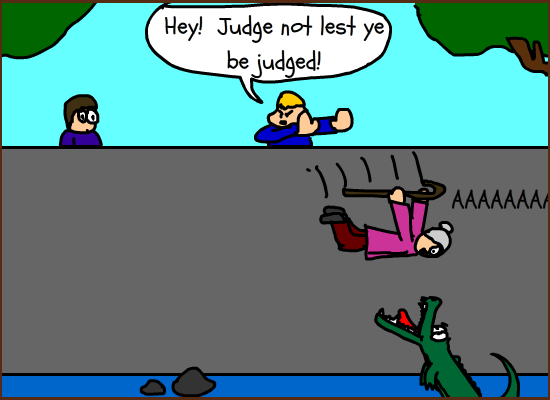So in our last installment, poor Cartoon Chris was having all his self-justifications systematically mutilated by Jesus's famous Sermon on the Mount - only a few self-justifications remain:
I wonder, what will happen to them? (Hint: bad things, very bad things)
I'm Good with God Because I'm Better Than Those OTHER People (Matthew 7:1-5)
Recently, the Research Institute for Confirming the Extremely Obvious reported that moral indignation stimulates the same pleasure centers in the brain as using heroin, eating "Hot Now" Krispy Kreme donuts, and dreaming about Jewel Staite. That is to say, it's hugely addictive and extremely fulfilling. It's no wonder it's such a huge temptation for evangelical Christians (along with the entire world, just to pick one relevant group) to divide the world into good guys and bad guys and dwell a lot on how rotten those bad guys are.
I've been in Sunday School classes that were mostly dead as far as class participation went:
Until:
Substitute whatever group of "bad guys" you want for "Pentecostals": liberals, conservatives, Baptists, Catholics, foreigners, your fellow citizens, whatever - the point is the same. Thinking about how bad someone else is gets us high because it makes us feel like good people without us having to do anything.
No wonder Jesus goes to town obliterating this particular line of thought (and Paul, and James...) It's extremely toxic, and very hard to root out. You can't root it out just making a stance against judgmentalism, however. That just makes you do this:
The opposite of judgmentalism is not antijugmentalism, but moral humility - admitting you're not a decent human being, and you have no right to look down on anyone at all. In fact, if you are not morally humble, you WILL be judgmental whether you realize it or not - maybe towards other people, maybe towards yourself, maybe towards God, but it's in there, and it will come out, and it will be gross, and it will probably annoy all your Facebook friends:
The only way out is to stop focusing on the sins of others and focus on your sins, as much fun as that is. Imagine how hard it would be to be self-righteous if every condemnation of someone else was required to be followed by an admission of guilt on your part:
Moral humility is really hard, and I don't claim to be an expert at it. But working towards it certainly seems better than what many people do: dilute Jesus's words on judgmentalism until they mean nothing:
Or what other people do: wield Jesus's words as a weapon against others in order to justify their own behavior:
Both radically miss the point. Take stock of your own sins, look them square in the eye, and forget about everyone else. Your condemnation of bad people doesn't make you good - it makes you self-righteous. God does not grade on a curve. You can be a little better than someone else and still be a terrible human being. There's plenty of room in hell for everybody.
I'm Good With God Because I'm No Worse Than the Majority of Humanity (Matthew 7:13-14)
Speaking of God not grading on a curve, consider Jesus's sobering admonition about the wide and narrow gates. We tend to think that life is a lot like a Disney movie - most of the characters are good guys, except for the one villain and his henchman. The villain gets what's coming to him but everyone else gets to celebrate and dance around to Alan Menken music as the credits roll. We think, I'm not any worse than the vast majority of people, so everything seems good. We don't mind failing a test if everybody failed. We don't mind being lost if we're in a big crowd. But Jesus flips this on its head - most people are taking the wide, easy path to destruction. There is ZERO comfort being in the majority, going with the flow, etc.
I'm Good with God Because I Called Jesus Lord (Matthew 7:21-23)
And then there's the most terrifying passage of all - there are many people who will bang on God's gate, having all done all kinds of things that would seem to guarantee them a spot in God's kingdom, and he will say, "Depart from me, I never knew you." That's horrifying, and humbling.
When I read this, and let down my guard, make myself truly vulnerable to God, I become nothing but a quivering mass of guilt and self-loathing:
But it's only there, in that dark crevice, in that place we desperately don't want to be, that I believe we can really be changed by God. It is only there that we understand how God could promise paradise to a criminal on a cross. It is only there that we can understand the rank absurdity, the unfairness, the illogic of God's forgiveness, and having understood and felt that forgiveness, when we have NO reason to expect it or feel entitled to it, that we can then turn and show that radical forgiveness to others. It is only there that we lose all inclination to judge our brothers and sisters. It is only there that we actually repent, and start to change. We have to let ourselves get there - and I don't claim to have gotten there nearly enough myself. But once we're there, God will take us out. He will show us love beyond our comprehension, and we will, more and more, turn that love to others. And having been given something valuable beyond life, we will understand the value of what it is we have to offer the world - a real, honest-to-God redemption - a redemption available to all through Christ. To me, this is the Gospel. So I challenge you (and myself), to let yourself go to that place, and let God pull you out.










